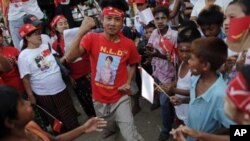Burma's parliamentary and by- elections
- 45 seats in the national legislature are being contested.
- 160 candidates from 17 parties and eight independents are running.
- Legislature comprised of 440 seat lower house, 224 seat senate, 14 regional assemblies.
- 25 percent of seats chosen by armed forces commander and reserved for military personnel.
- The Union Solidarity and Development Party (USDP) won 76 percent of the vote in 2010.
- Constitution limits lawmakers' powers.
As Burmese voters head to the polls Sunday, the Burmese exile community in Thailand is expressing asking whether or not the country is truly on a path to reform.
The editor of the online newspaper The Irrawaddy, Aung Zaw, recently returned from visiting Burma after living in exile for 20 years. The crowds turning out for rallies for Aung Sang Suu Kyi are inspiring, he said.
“People are so poor. They live in poverty, but they come out and cheer," said Aung Zaw. "It is so moving to see people and they are so hopeful and it shows that they see Suu Kyi as the hope. And with Suu Kyi they have no fear. Their problem is they do not know what is next.”
Burmese exiles in Thailand have long been critics of the government back home, and many remain skeptical about its commitment to reform. Burmese migrant worker rights groups say they suspect the identities of their members living abroad may be linked to an attempt to commit voter fraud in Sunday’s poll.
Families are being forced to vote for the ruling Union Solidarity and Development Party (USDP), said Myint Wai, a director with the Thai Action Committee for Democracy in Burma.
“Migrant workers in Thailand, the [Burmese] government has done nothing to arrange to practice our rights and many people they have family member has had to agree to give their vote to the government,” he said.
The by-election for 48 seats in the 640 member parliament will do little to affect the overall balance of power in government. But Burmese in exile say they still fear voting irregularities like those seen in the last vote in 2010 that was widely dismissed as fraudulent.
Soe Aung, a spokesperson for the Forum for Democracy in Burma based in Thailand, said it is hard to think of these elections are genuine.
“There has been a lot of intimidation, vote buying and even dead people could show up on the voters’ list, so these irregularities are a repeat of the 2010 election."
Since that election, the country has released Aung San Suu Kyi from house arrest, released hundreds of political prisoners,and loosened censorship regulations against news media.
That has led to positive engagement from Western countries, including the United States, which sent Secretary of State Hillary Clinton to visit late last year.
Despite the hopeful signs, many in Burma remain cautious over the pace of change, editor Aung Zaw said.
“I find and discover a lot of skeptical voices and people remain very, very, very, very skeptical about this reform process in our country. A lot of people inside the country who speak Burmese, who read Burmese, who communicate in our language, do not wear rose-colored glasses,” said Aung Zaw.
Burma’s military retains outsize influence in the government and the ruling party commands a super majority of legislative seats. Rights groups say there are still about 900 prisoners of conscience in Burmese jails.
But some observers say the recent changes have made a big impact, measured by the crowds of people who are energized at political rallies. Sunday’s vote will be a key test of the country’s direction, said prominent Burmese journalist Thiha Saw.
“Watch it very closely because this will be something like a marker or a test about the sincerity of the regime," Thiha Saw said. "Are they going to make it really ‘free and fair’? It has got to be free and fair for the sanctions. So this is important for Burma as well as for the international community.”
Others are less hopeful for a fair vote, but say it will still be important. Debbie Stothard is spokeswoman for the rights group, Alternative ASEAN network.
“We fully expect these by elections to be as unfair and unfree as the 2010 elections because the same laws and rules are being used," she said. "However, we also do expect that a handful of NLD candidates will be allowed into the parliament in a move to convince the international community to lift sanctions.”
International observers from Asia, the European Union, Japan, Canada, Australia and the United States, as well as dozens of foreign journalists have descended on Burma for the vote.
A Look at Some of Burma's Key Political Parties
National League for Democracy
|
Union Solidarity and Development Party
|
National Democratic Force
|
Shan Nationalities League for Democracy
|
Shan Nationalities Democratic Party
|
National Unity Party
|




